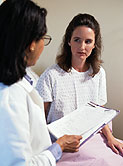- The Best Time of Day to Drink Bone Broth to Maximize Health Benefits
- 8 Ways to Increase Dopamine Naturally
- 7 Best Breads for Maintaining Stable Blood Sugar
- Gelatin vs. Collagen: Which is Best for Skin, Nails, and Joints?
- The Long-Term Effects of Daily Turmeric Supplements on Liver Health
- Could Your Grocery Store Meat Be Causing Recurring UTIs?
- Are You Making This Expensive Thermostat Error This Winter?
- Recognizing the Signs of Hypothyroidism
- 10 Strategies to Overcome Insomnia
- Could Artificial Sweeteners Be Aging the Brain Faster?
FDA Experts Debate Timing of Pap Test


The Pap test has been a routine gynecological procedure for generations of American women. But on Wednesday, a Food and Drug Administration advisory panel is considering whether to delay the Pap test and use an HPV test as a first step in cervical cancer screening.
Specifically, the agency’s Medical Devices Advisory Committee Microbiology Panel is being asked to evaluate the cobas HPV (human papillomavirus) test made by Roche Molecular Systems.
HPV, a sexually transmitted virus, is thought to cause the majority of cervical cancers. Certain strains, such as HPV 16 and 18, are most strongly tied to these tumors. The virus also causes genital warts in both men and women and certain head and neck cancers.
Roche is looking for the FDA to approve its HPV test as a first-line diagnostic tool. Women who test positive for the two high-risk HPV strains would then be asked to undergo colposcopy, which involves a device that allows the doctor to get a clear view of the vulva, vagina and cervix and take a sample for testing.
In addition, women who did not have HPV 16 or 18 but had other high-risk types of the virus would then have a Pap test to see if a colposcopy was needed. The data the committee is looking at comes from a trial called ATHENA that included more than 47,000 women.
For its part, the FDA is looking for the panel’s recommendation as to whether the HPV test does the job for which it is intended, and performs it in a safe manner. The agency is also asking the panel whether any risk associated with the test outweighs its benefits.
Although the FDA is not required to follow its advisory panels’ recommendations, it usually does so.
Testifying before the panel, Dr. David Chelmow, chair of the Department of Obstetrics and Gynecology at Virginia Commonwealth University School of Medicine, noted that “cervical cancer screening has been a huge success in decreasing cervical cancer incidence and death.”
Chelmow, representing the American College of Obstetricians and Gynecologists, added that “the College strongly supports further improving cervical cancer screening through the introduction of new paradigms such as HPV testing for primary screening. HPV testing as a primary screening method for cervical cancer is very promising, and appears effective for screening for cervical cancer.”
Currently, the cobas HPV test is approved for use among women 21 and older who have already received an abnormal Pap test. It is also approved as an add-on to a standard Pap test in women 30 to 65. According to Roche, the cobas HPV test is able to screen for a variety of high-risk strains of HPV.
Dr. Andrew Menzin, a gynecologic oncologist at North Shore University Hospital in Manhasset, N.Y., said that “HPV testing has been a remarkable advance in cervical cancer screening.”
Its greatest value is helping to decide whether a follow-up colposcopy is needed, he said. “The idea of reversing the order of testing is an approach to try to refine and minimize who [unnecessarily] goes on to colposcopy,” he said.
Whether doctors will accept using an HPV test first instead of a Pap test will depend upon the clinical trial data supporting it and on doctors and patients being educated about it, Menzin believes.
He noted that current guidelines still favor using the Pap test first, “but the guidelines continue to evolve.”
Although screening for cervical cancer is vital, it is not the only reason women should have a gynecological exam, Menzin added.
“Women should follow the current guidelines and have routine gynecological examinations,” he said. “Gynecological care is more than cervical cancer screening.”
HPV is a sexually transmitted virus that is the cause of about 70 percent of all cervical cancers.
There are also two approved vaccines, Gardasil and Cervarix, that can protect against HPV. The U.S. Centers for Disease Control and Prevention recommends that all young girls and boys be vaccinated beginning at ages 9 to 11.
More information
For more on cervical cancer, visit the American Cancer Society.
Source: HealthDay
Copyright © 2026 HealthDay. All rights reserved.










